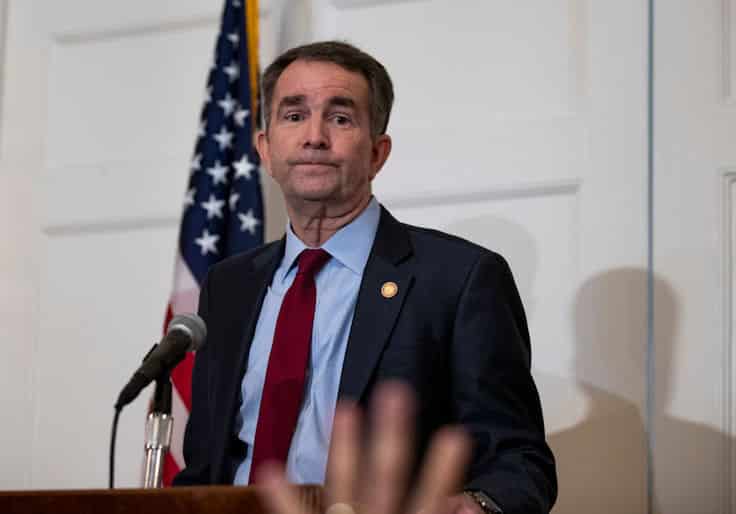Virginia Democrats abandoned their pledge to pass major gun confiscation laws as they enter a contentious 2021 campaign season.
The party, which enjoys total control over the state government, did not pass any major new restrictions on guns in 2021. Democrats failed to act on the most ambitious aspects of their gun-control agenda—including proposed bans on the kinds of guns or ammunition magazines Virginians can own—before the end of the session on March 1. Despite repeated promises from party leaders dating back to the 2019 campaign, Democrats passed only minor new restrictions, including new laws to regulate where Virginians can carry guns; residents will be prohibited from bringing firearms near polling places and in school administration buildings under the new regulations. Democrats did not even introduce the hallmark gun legislation to ban possession of AR-15s and magazines holding more than 10 rounds—proposals that passed the state house in 2020 but sparked protests across the state before failing in the state senate.
Delegate Mark Levine (D.), who introduced the confiscation bill in the 2020 session, said the bill would “save lives” and make “mass murder” harder to carry out during debate in 2020. In December, he said he would not reintroduce the bill and told a Richmond ABC affiliate Democrats would focus on “things that are less controversial.”
Governor Ralph Northam (D.), whose initial confiscation proposal was even broader than the bill that passed the state house in 2020, also shied away from the issue in an interview with the station. After admitting the gun ban was a “campaign promise that a lot of us ran on,” Northam said he would let the legislature decide whether to pursue the legislation again. When asked if he would push them to do so, he said, “No, not this year.”
Northam and Levine did not respond to requests for further comment about the decision not to pursue the ban in 2021.
Democrats’ reluctance to press the issue and potentially further anger gun voters demonstrates a new political calculation from liberals at the national and state level. Even when Democrats have full control of the lawmaking process, passing strict new gun laws may prove too politically costly for their members, according to experts who spoke with the Washington Free Beacon. They said the retreat on assault weapons confiscation is likely driven by concerns it could do more harm than good for Democratic members in swing districts, rather than a change of heart on the policy. Robert Leider, a George Mason University professor who studies gun politics, said there are more single-issue voters who favor gun rights than there are gun-control proponents. He said that principle extends beyond Virginia’s borders.
“Democrats in moderate and conservative districts recognize this and avoid drastic gun-control measures that will rally gun advocates against them,” Leider said. “Gun-control advocates have a particularly difficult time taking away people’s vested interests, such as confiscating guns already in circulation or canceling concealed carry permits.”
J. Miles Coleman, associate editor of Sabato’s Crystal Ball at the University of Virginia, said Democrats are hoping the 2020 gun reform package—which included a universal background check bill and limitations on gun carry—will be enough to appease gun-control advocates leading into the election. He said Democrats may be trying to focus on other top issues including economic recovery and critiques of their school reopening plans.
“I can definitely see how the Democrats would be less likely to act on this type of legislation, given the election-year dynamic,” Coleman said. “Gun control is an issue that seems to galvanize conservative voters more than liberal voters—in Virginia and other, more swingy states—so I can see it taking something of a backseat to other issues in the Democrats’ midterm messaging.”
Coleman pointed to the highly publicized role white supremacists played in the Capitol riot and its effect on minority gun ownership as one of the new problems facing efforts to restrict guns.
“There’s probably just less of an appetite for more restrictive gun rules among minority votes,” Coleman said. “Democrats, who will need to turn out those voters, wouldn’t want to make gun control a huge issue.”
Philip Van Cleave, president of the Virginia Citizens Defense League, which helped organize protests against the confiscation bill, said the reversal came because Democrats were fearful of political backlash. As Democrats moved to pass the assault weapons confiscation bill in 2019, nine out of every 10 Virginia counties declared themselves “Second Amendment Sanctuaries” and refused to help enforce any gun law they viewed as unconstitutional—with supporters turning out in droves even in blue parts of the state.
“I think they found out last year when they tried it really blew up in their face big time,” Van Cleave told the Free Beacon. “Then they had to tap dance to get out of it when they saw the Second Amendment sanctuary movement explode. They saw that and then they saw massive turnout on lobby day, 50,000 people. I think that was when their little balloon popped.”
Experts, gun-rights activists, and the Democrats themselves agreed the decision to pull back on the confiscation effort in 2021 does not signal the effort’s end.
“That doesn’t mean I’ve given up fighting for this cause,” Levine told the ABC affiliate. “The goal is to stop making it really easy to commit mass murder.”
Delegate Kirk Cox, a Republican and former speaker of the state house who is running for governor, described the move as a “pause” and said “one-party Democratic control in Richmond” would eventually lead to stricter gun laws.
“Virginia Democrats only took a pause from instituting a ban on semi-automatic sporting rifles during this session because they want to hold on to the Governor’s Mansion, and know that Republicans like Kirk Cox pose a real threat to their unilateral power,” Elizabeth Gregory, Cox’s communications director, told the Free Beacon.
Van Cleave said Democrats are trying to walk a fine line between paying back the tens of millions of dollars invested into their campaigns by gun-control activists like Michael Bloomberg while avoiding motivating enough gun voters to flip control of at least part of the legislature to Republicans.
“They know that if gun owners stay awake and angry and get to the polls, they’re going to lose seats,” Van Cleave said. “They’re tap dancing, having to pay back Bloomberg for his investment in all of their races. And yet, if gun owners turn out, Bloomberg money isn’t going to help.”






